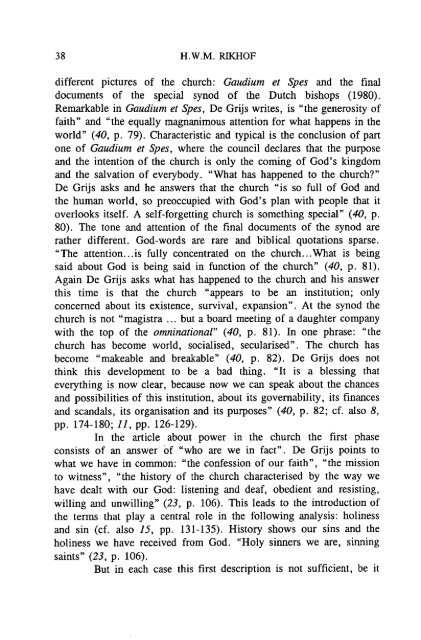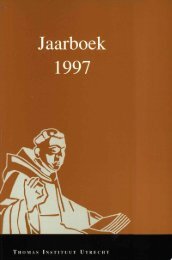Jaarboek Thomas Instituut 1995 - Thomas Instituut te Utrecht
Jaarboek Thomas Instituut 1995 - Thomas Instituut te Utrecht
Jaarboek Thomas Instituut 1995 - Thomas Instituut te Utrecht
Create successful ePaper yourself
Turn your PDF publications into a flip-book with our unique Google optimized e-Paper software.
38 H.W.M. RIKHOF<br />
different pictures of the church: Gaudium et Spes and the final<br />
documents of the special synod of the Dutch bishops (1980).<br />
Remarkable in Gaudium et Spes, De Grijs wri<strong>te</strong>s, is "the generosity of<br />
faith" and "the equally magnanimous at<strong>te</strong>ntion for what happens in the<br />
world" (40, p. 79). Charac<strong>te</strong>ristic and typical is the conclusion of part<br />
one of Gaudium et Spes, where the council declares that the purpose<br />
and the in<strong>te</strong>ntion of the church is only the coming of God's kingdom<br />
and the salvation of everybody. "What has happened to the church?"<br />
De Grijs asks and he answers that the church "is so full of God and<br />
the human world, so preoccupied with God's plan with people that it<br />
overlooks itself. A self-forgetting church is something special" (40, p.<br />
80). The tone and at<strong>te</strong>ntion of the final documents of the synod are<br />
rather different. God-words are rare and biblical quotations sparse.<br />
"The at<strong>te</strong>ntion .. .is fully concentra<strong>te</strong>d on the church ... What is being<br />
said about God is being said in function of the church" (40, p. 81).<br />
Again De Grijs asks what has happened to the church and his answer<br />
this time is that the church "appears to be an institution; only<br />
concerned about its exis<strong>te</strong>nce, survival, expansion". At the synod the<br />
church is not "magistra ... but a board meeting of a daugh<strong>te</strong>r company<br />
with the top of the omninational" (40, p. 81). In one phrase: "the<br />
church has become world, socialised, secularised". The church has<br />
become "makeable and breakable" (40, p. 82). De Grijs does not<br />
think this development to be a bad thing. "It is a blessing that<br />
everything is now clear, because now we can speak about the chances<br />
and possibilities of this institution, about its governability, its finances<br />
and scandals, its organisation and its purposes" (40, p. 82; cf. also 8,<br />
pp. 174-180; 11, pp. 126-129).<br />
In the article about power in the church the first phase<br />
consists of an answer of "who are we in fact". De Grijs points to<br />
what we have in common: "the confession of our faith", "the mission<br />
to witness", "the history of the church charac<strong>te</strong>rised by the way we<br />
have dealt with our God: lis<strong>te</strong>ning and deaf, obedient and resisting,<br />
willing and unwilling" (23, p. 106). This leads to the introduction of<br />
the <strong>te</strong>rms that play a central role in the following analysis: holiness<br />
and sin (cf. also 15, pp. 131-135). History shows our sins and the<br />
holiness we have received from God. "Holy sinners we are, sinning<br />
saints" (23, p. 106).<br />
But in each case this first description is not sufficient, be it








